Key takeaways:
- Self-esteem is influenced by external validation and personal achievements; building it requires recognizing one’s intrinsic value.
- It plays a crucial role in recovery by fostering resilience and motivation; positive self-talk and focusing on strengths can enhance the healing process.
- Identifying and addressing signs of low self-esteem, such as seeking validation and overwhelming negativity, is essential for personal growth.
- Supportive relationships and mutual encouragement are vital for maintaining self-esteem and fostering a sense of belonging.
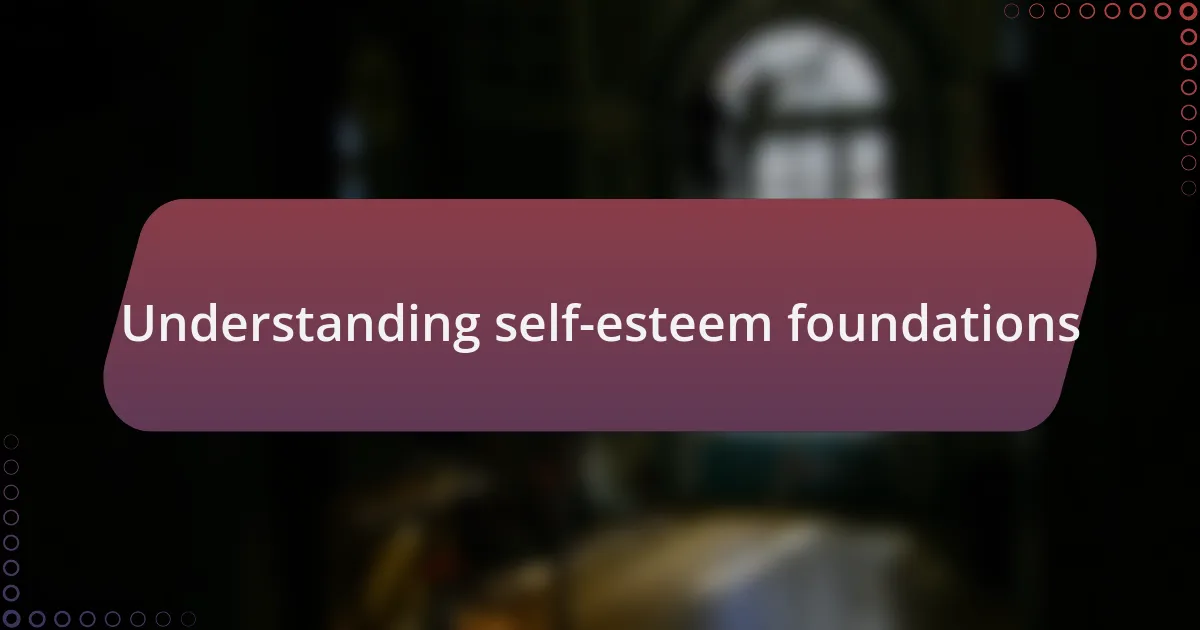
Understanding self-esteem foundations
Understanding the foundations of self-esteem begins with recognizing that it is deeply rooted in our experiences and relationships. I remember a time when I questioned my capabilities after facing criticism from someone I looked up to. It’s intriguing how a few words can set off a chain reaction, making us doubt our worth.
We often derive our self-esteem from external validations, such as praise from friends, family, or even colleagues. I can recall moments when a simple compliment made my day, boosting my confidence. However, it’s essential to ask ourselves: How much should we let others dictate how we feel about ourselves? Building a foundation of self-esteem means learning to appreciate our own value irrespective of others’ opinions.
Moreover, understanding this foundation requires introspection. I discovered that my self-esteem was also tied to my accomplishments, big and small. Reflecting on past achievements—like completing a challenging project—helped me reclaim parts of myself I thought were lost. Isn’t it fascinating that by recognizing our strengths and experiences, we can lay a more secure and personal groundwork for self-esteem?
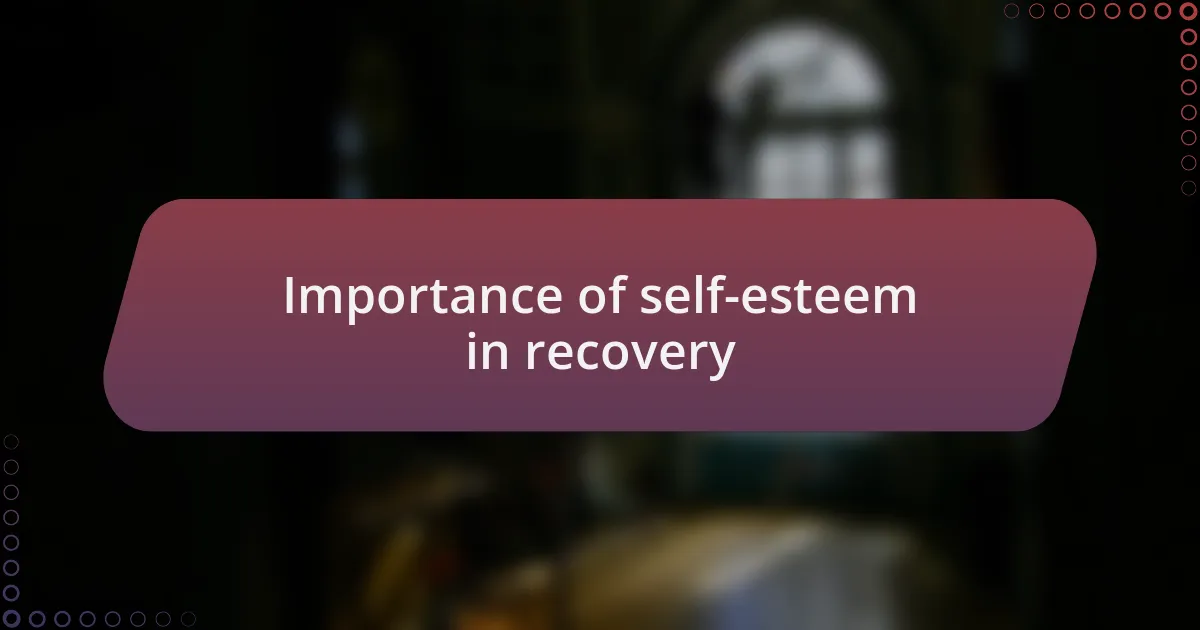
Importance of self-esteem in recovery
Self-esteem plays a critical role in the recovery process, serving as a foundation for personal growth and healing. I remember when I was navigating my own path to recovery; my self-esteem felt fragile, like a thin layer of ice. Each positive thought I nurtured reinforced my ability to overcome challenges, reminding me I was more resilient than I believed at that time.
Feeling good about ourselves shapes our motivation to engage in recovery practices. When I focused on my strengths, even if they were subtle, it became easier to seek treatment or reach out for support. Have you ever noticed how an encouraging thought can propel you to take the next step in your healing journey? It’s like a spark that ignites a fire within us.
Additionally, self-esteem fosters resilience in the face of setbacks. I recall facing a significant obstacle during my recovery, and it was my belief in my worth that helped me persevere. Each time I embraced my imperfections, I learned that recovery isn’t linear but rather a winding path—one where self-acceptance becomes the beacon guiding us forward.
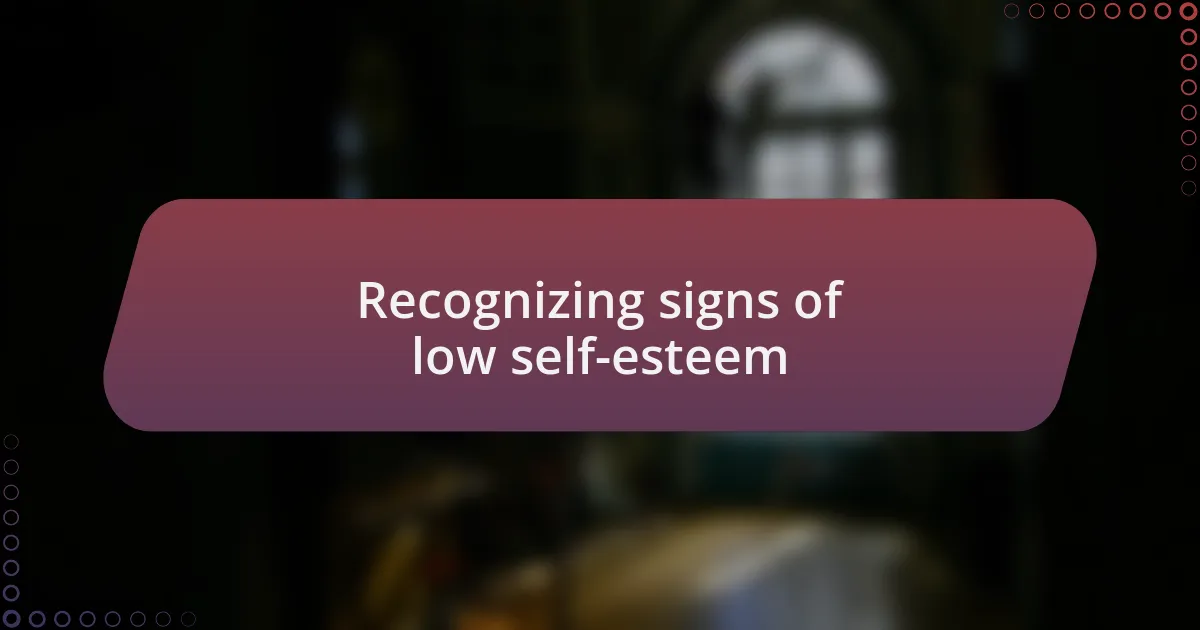
Recognizing signs of low self-esteem
Recognizing low self-esteem can be subtle yet profound. I remember moments when I would compare myself to others, often feeling inadequate or unworthy of success. Have you ever found yourself in a similar spiral, where self-doubt clouds your perspective? It’s an emotionally draining experience that we often fail to acknowledge.
One clear sign of low self-esteem is a constant need for validation from others. There were times I sought approval for my choices, even over trivial matters, thinking it would somehow confirm my worth. This dependency can hinder growth, as it distracts us from developing our own sense of value.
Feeling overwhelmed by negativity is another indicator. I often found myself lost in a haze of self-criticism, berating my mistakes instead of learning from them. This cycle not only steals joy but can paralyze us in moments where we should feel empowered. Can you relate to that feeling of being your own worst enemy? It’s crucial to recognize these patterns as the first step toward rebuilding self-esteem.
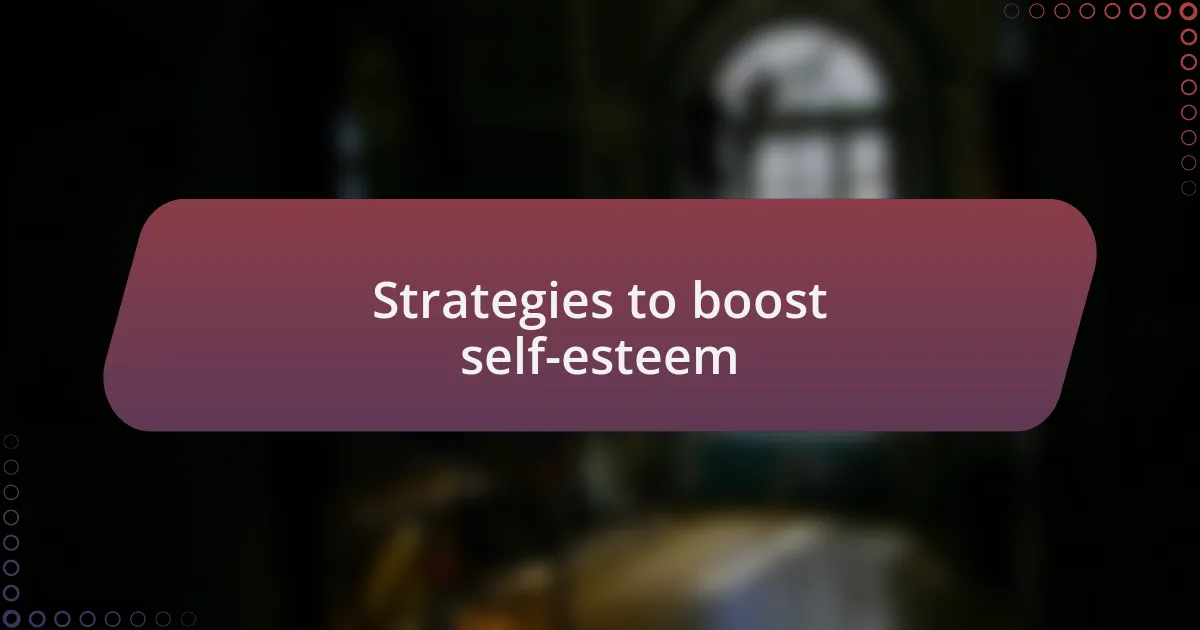
Strategies to boost self-esteem
One effective strategy I’ve found to boost my self-esteem is setting small, achievable goals. For example, I once challenged myself to wake up 15 minutes earlier each day. This seemingly minor change made a significant impact on my outlook. It gave me a sense of accomplishment and control, which gradually built my confidence. Have you ever tackled a small goal that made you feel powerful?
Another technique revolves around positive self-talk. I began replacing negative thoughts with affirmations, like telling myself, “I am enough” when feelings of inadequacy crept in. This practice wasn’t easy at first; it felt somewhat forced. However, I noticed it reshaped my internal dialogue over time, making me more compassionate toward myself. How do you usually speak to yourself during tough times?
Finally, surrounding myself with supportive and encouraging people has been invaluable. I actively sought relationships that uplift me — those who celebrate my successes and comfort me during my lows. It made me realize how much our environment influences our self-worth. Have you considered the impact of the people around you on your self-esteem?
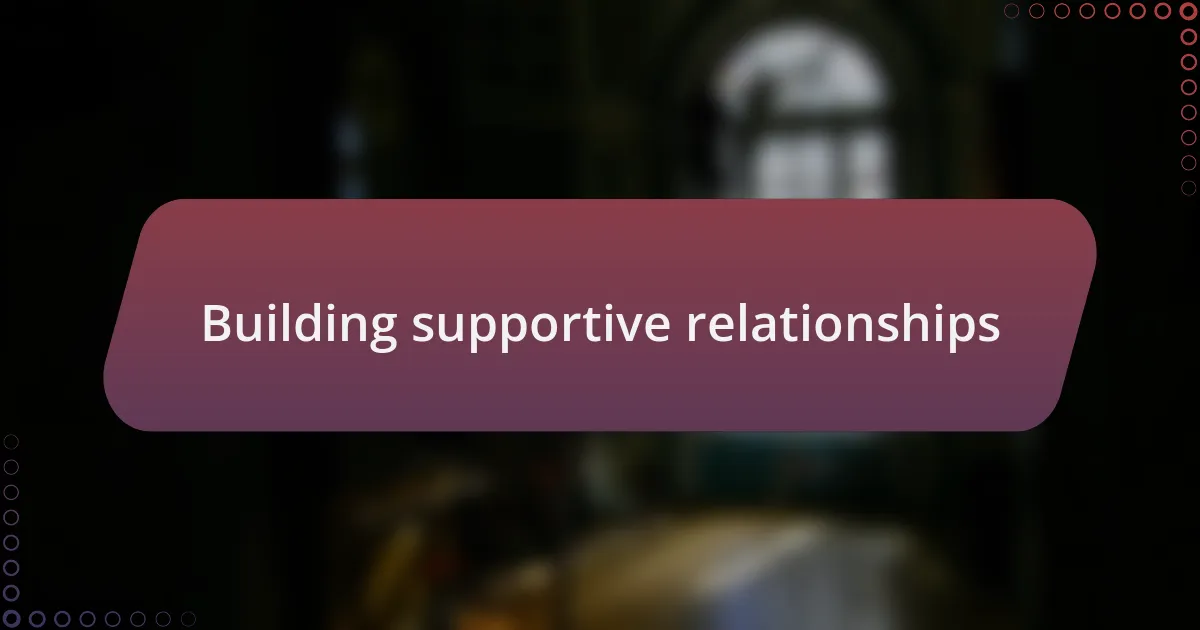
Building supportive relationships
Building supportive relationships has been a cornerstone of my journey toward regaining self-esteem. I remember a time when I felt isolated and unsure about myself. Reaching out to a close friend for support opened the door to meaningful conversations that not only helped me feel heard but also reminded me of my worth. Reflecting on those moments, I often wonder: how many of us underestimate the power of just having someone listen?
Creating a nurturing circle isn’t just about having friends; it’s about intentionally choosing positivity. I found that by limiting interactions with those who drain my energy, I made space for individuals who uplift and inspire me. Have you ever noticed how your mood shifts after spending time with specific people? For me, surrounding myself with positivity has been transformative, reinforcing the belief that I deserve to be celebrated and valued.
Over time, I’ve learned the importance of mutual support in relationships. I make it a point to return the favor by being a source of encouragement for others in their tough times. This exchange of support not only strengthens our bond but also fosters a sense of belonging. Isn’t it fascinating how giving support enriches both parties involved? Each connection I nurture adds another layer of resilience to my self-esteem.
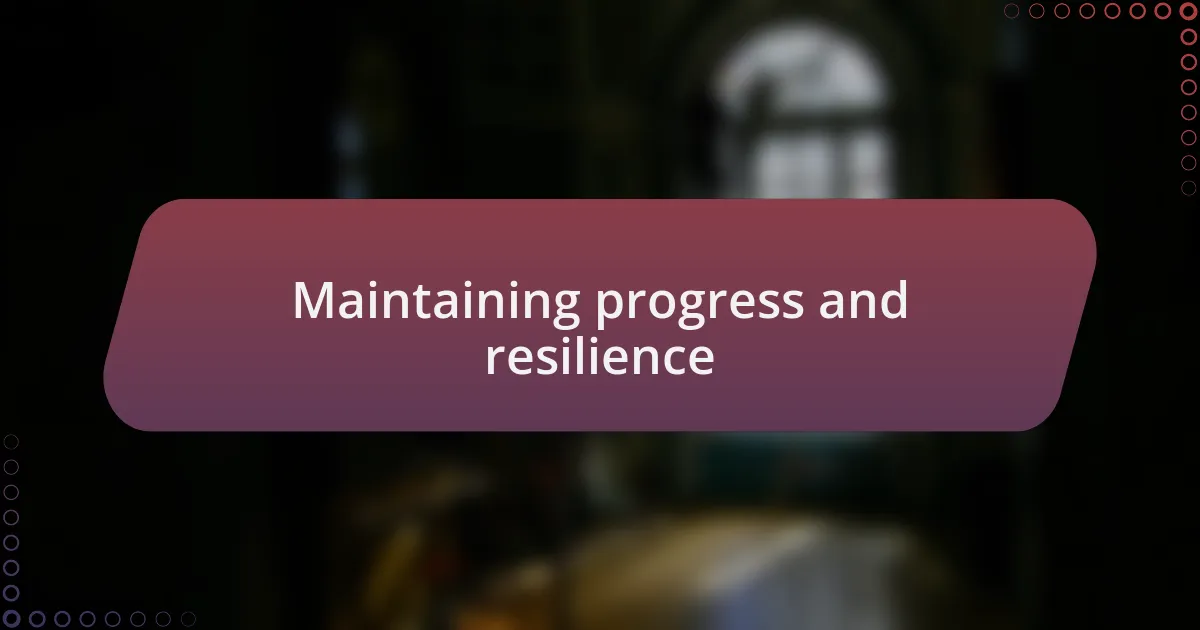
Maintaining progress and resilience
Maintaining progress in rebuilding self-esteem requires constant self-awareness and self-care. On days when I felt like I was slipping back into old patterns, I turned to journaling as a reflective tool. Writing down my thoughts helped me identify triggers and patterns, making it easier to navigate my feelings. Have you ever stopped to evaluate what thoughts bring you down? I found that this practice not only kept me focused but also allowed me to celebrate small victories, reinforcing my growth.
Resilience isn’t just about bouncing back; it’s also about staying grounded. I remember facing moments when self-doubt sneaked back in, often during situations that tested my confidence. In those times, I leaned on affirmations, repeating phrases like “I am worthy” until they became part of my internal dialogue. Have you tried positive affirmations? For me, they acted as a mental shield against negativity, providing a reminder of my worth even when I wavered.
Balancing ambition with self-acceptance has been crucial in my journey. I’ve realized that striving for goals doesn’t mean I should dismiss my feelings of inadequacy. In fact, embracing those feelings has taught me to be patient with myself. It’s a continuous journey, isn’t it? Navigating progress and setbacks has woven resilience into the fabric of my self-esteem, helping me understand that growth is not linear but rather a series of peaks and valleys I can learn from.
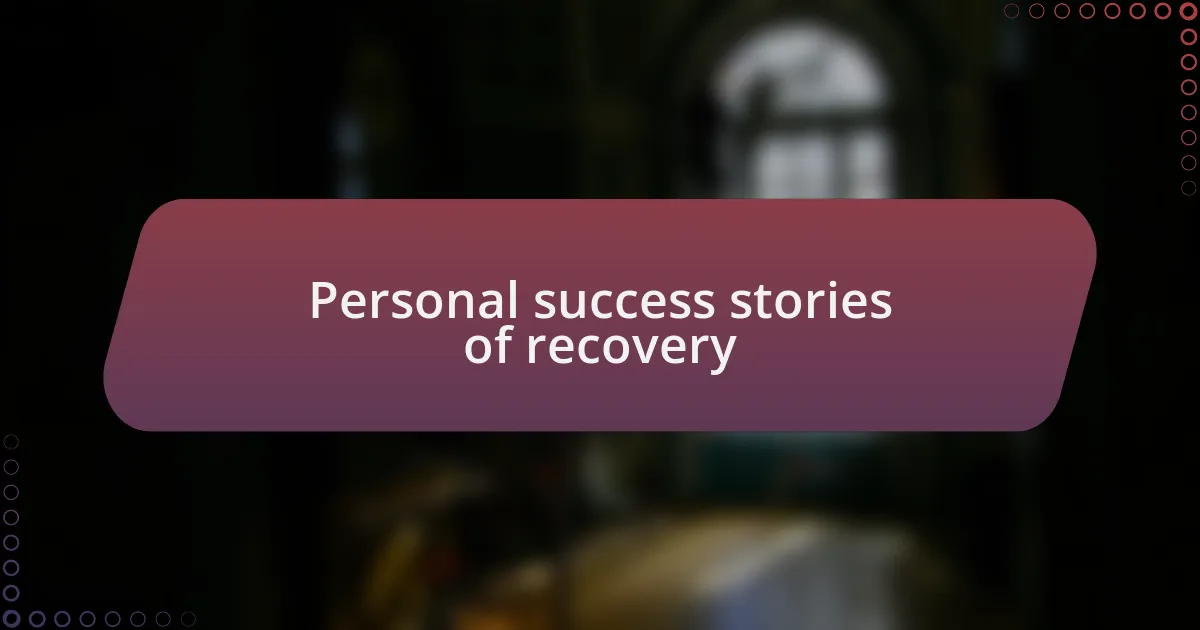
Personal success stories of recovery
When I reflect on my recovery journey, I can’t help but think about the moment I decided to share my story with others. That first time I opened up in a support group, I felt such a wave of relief washing over me. Have you ever shared your struggles with someone and felt that instant connection? It’s incredible how vulnerability can strengthen bonds. Hearing others’ success stories inspired me to see my own potential, reinforcing that we’re never truly alone in our battles.
One particular story stands out: a peer in my group spoke about how she forgave herself for past mistakes, which was a game changer in her recovery. At that moment, I realized I had been holding onto my past, allowing it to overshadow my present. Isn’t it fascinating how one person’s experience can shift your perspective? Engaging in that dialogue shifted my focus from self-judgment to self-compassion, and I started embracing the idea that mistakes are stepping stones, not stumbling blocks.
As my confidence grew, I ventured into new territory by pursuing hobbies I had long abandoned, like painting. The first time I picked up a brush again, I felt a mix of excitement and fear. Have you ever stepped back into something that made your heart race? Each stroke became an expression of my evolving self-worth. This simple act of creativity blossomed into a source of joy and pride, solidifying the belief that I am capable of more than I ever thought possible.